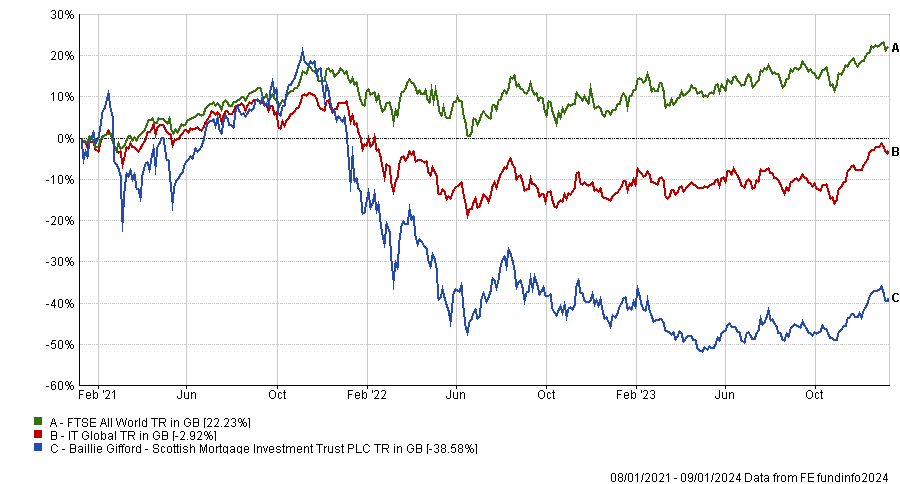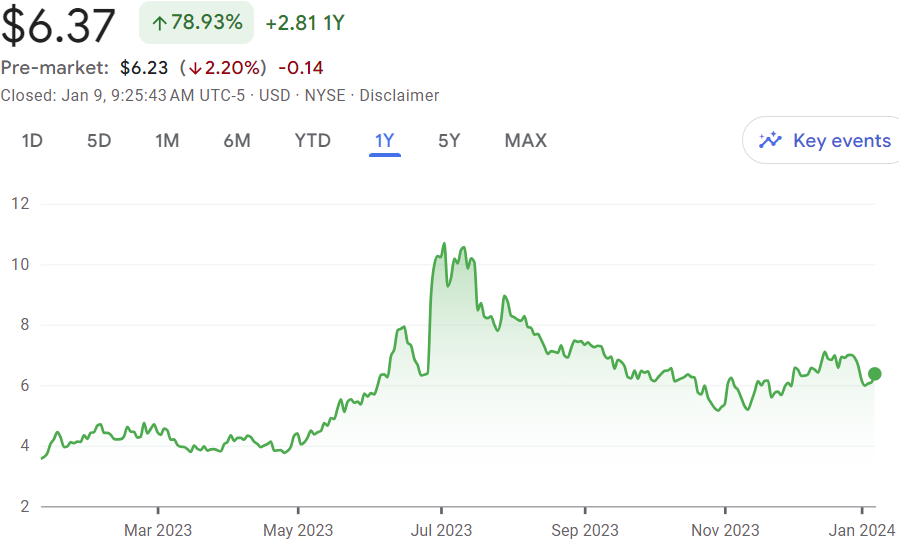Progress is rarely a straight line, as growth investors such as Scottish Mortgage deputy manager Lawrence Burns should know well. There will be periods when expectations will run ahead of reality and periods when the most successful businesses encounter obstacles.
That’s what’s happened to Nvidia, the most profitable business of 2023, which had some hardship to endure before making it. For example, its share price fell more than 10% some 20 times in the seven years it’s been held within Scottish Mortgage and in 2022, its shares fell about 66% from their peak.
Scottish Mortgage itself has known a bumpy period recently, with people turning against growth-focused investments in 2022 and some more fund-specific problems in 2023 caused by concerns around board disputes, level of gearing and exposure to unquoted companies.
Performance of fund vs sector and index over 3yrs
Source: FE Analytics
“That was bumpy and painful, but thank goodness we endured,” said Burns with regards to Nvidia, who went on to highlight three companies that might have similar bumpy rides to success, but will be “transformational” if and when they get there.
Centred around the transition to a post-hydrocarbon economy, the first one is Climeworks, a Swiss company that is “spearheading carbon dioxide removal via direct air capture (DAC)”, meaning that it’s developing and commercialising the technology to capture carbon dioxide directly from the air and store it underground.
“If successful, it will be one of the most critical companies of the next several decades. Today, it has the only operational DAC storage facility in the world – the Orca plant in Iceland which is capable of removing 4,000 tons of CO2 from the atmosphere a year,” Burns said.
“It recently received a ‘Notification of Selection’ from the US Department of Energy as one of the companies set to benefit from up to $1.2bn investment into this emerging technology.”
For his second pick, Burns remained interested in what occurs in the skies, where global logistics company Zipline uses autonomous drones to deliver medicines, vaccines and other vital products on demand.
“Initially focused on delivering blood via drones in emergencies to areas in rural Rwanda, the company now operates the world’s largest autonomous delivery system reaching around 25 million people globally,” said the manager.
“In 2024 it will start delivering critical medical supplies and frequently-needed products for the NHS. It seems to have barely even scratched the surface of what can be achieved in terms of servicing e-commerce with drones, a trend that is already taking hold in China.”
With the gaze still upwards, Burns saw potential for urban public transport, as Joby Aviation is developing “the Uber of the skies” – a quick, safe, quiet and green aerial transportation in cities around the world.
“This is such a universal need and an enormous market if the company can get it right. It will face challenges to capture the payoff – being certified as safe is a huge undertaking in the modern aerospace industry. From a business perspective, it will have to pivot from design, to manufacture at scale, to operationalisation. But if it can execute successfully, the skies are the limit,” he said.
Performance of stock over the past year
Source: Google Finance
“These are all opportunities that are particularly early in their development for Scottish Mortgage, but that offer potentially profound long-term consequences for society and rewards for their investors. It is important we plant the seeds for companies that could become our outliers of the future,” the manager concluded.
Turning to stocks that are at more mature stages, Burns believes that despite the disruption that artificial intelligence (AI) has caused in 2023, people still haven’t fully grasped its true potential.
“Despite having been thinking about AI for a very long time, the recent progress has still surpassed our expectations. The manager of a leading AI firm recently made the point to me that the progress in AI was basically eating Moore’s Law for breakfast, going faster than he ever dreamed possible,” he said.
“I don’t think anyone has fully realised what AI can do. We are constantly trying to broaden our knowledge in this area.”
Here, the manager pointed out the growing long-term demand for computing power and the much higher need for hardware, currently benefiting Nvidia but also increasingly other key suppliers of the semiconductor industry, such as ASML, as well as those that provide the cloud infrastructure (Amazon Web Services) and those providing related services in the cloud, for example Snowflake and Databricks.
Tesla is “an obvious example” of a company that is developing core business solutions using AI, and finally, Burns suspected companies that have enormous amounts of proprietary data to train models and digital-first cultures “are also likely to be well-placed to harness the power of AI”, whether that’s Ocado to improve warehouse automation or Zalando to improve fashion personalisation.
“Gutenberg’s printing press unlocked immense value by making it easy to disseminate human knowledge, causing a cascade of beneficial second and third-order effects. AI could be the modern equivalent for intelligence, increasing our understanding and capabilities to a degree and scale that’s hard to fathom,” said Burns.
“As a long-term growth investor, I can’t imagine a more disruptive, exciting investment opportunity.”
Veteran manager Terry Smith, however, warned against trying to pick future AI winners in a sector with a vast number of contenders and where there could be no winner at all.




